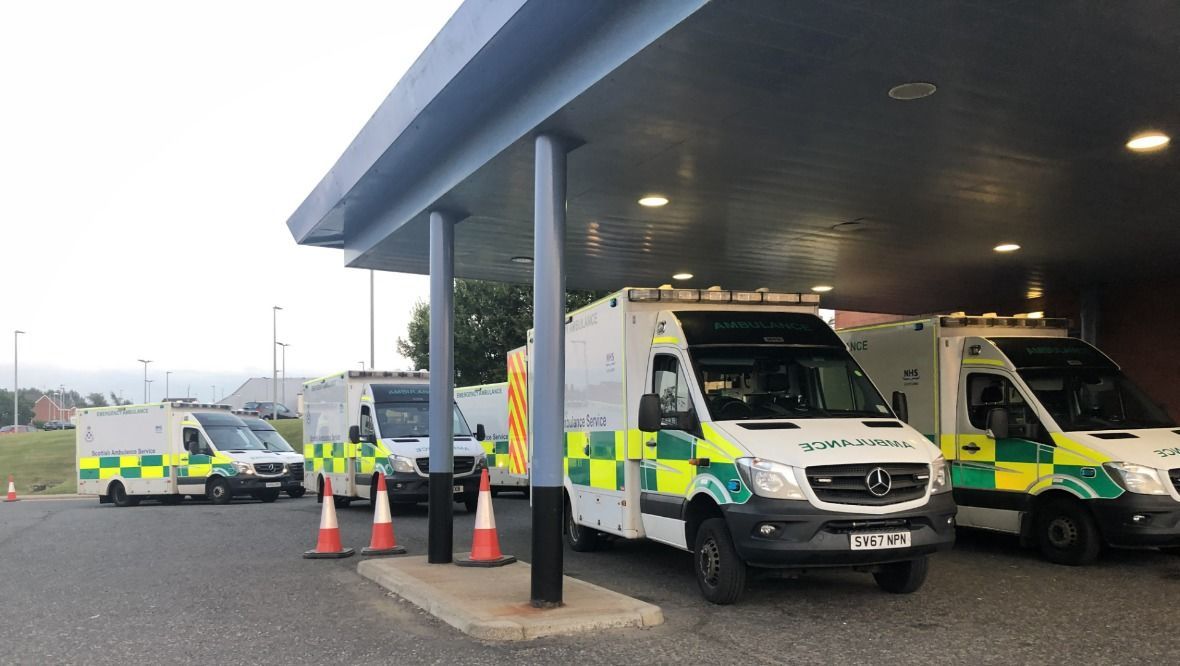Ambulance staff have joined fellow healthcare workers in voting for strike action over a pay dispute.
Over 4,000 members of the GMB union, covering paramedics, technicians, nurses, porters and radiographers, have backed industrial action in a bid to secure an improved pay offer.
NHS Scotland staff said the Covid-19 pandemic “exposed and exacerbated chronic shortfalls” in staffing levels, adding workers had been “significantly undervalued”.
It comes as recent figures showed waiting times in Scotland’s accident and emergency departments have hit their worst ever monthly performance on record.
Figures for September revealed the four-hour waiting time target was missed for more than three out of ten patients.
Meanwhile, one in ten (10.2%) of patients were there for a minimum of eight hours – a total of 13,506 people.
Around 89% of GMB members in the ambulance service who participated in the ballot backed strikes, along with 98% of members in Greater Glasgow and Clyde Health Board, 97% in Lanarkshire, 94% in Forth Valley, and 88% in Lothian.
GMB Scotland organiser, Karen Leonard, called on the health secretary to bring forward a new offer to satisy “exhausted and increasingly angry” members.
She added: “There should be no surprise in government circles about this clear mandate delivered by our members; their strike threat is the inevitable consequence of years of austerity and managed decline in our NHS by political leaders and the unsustainable pressures this has placed on a workforce that everyone depends on.
“But this is also an opportunity for Humza Yousaf to listen to the workers’ voice and bring forward the significantly improved offer that he promised just a few weeks ago, otherwise the country faces the real prospect of strike actions this winter across NHS Scotland and the ambulance service.”
The Scottish Government’s target of having patients seen and either admitted, transferred or discharged within four hours was met for 69% of patients during the month.
Opposition parties branded the latest data “utterly appalling”, claiming that there is now a “full-blown crisis that requires immediate action” in A&E.
The latest weekly figures, which cover the seven days to Sunday, October 23, showed the four-hour target was met for fewer than two-thirds (65%) of patients in that period.
Over the week there were 8,473 patients in A&E for more than four hours, with 3,072 there for eight hours or more and 1,391 kept waiting for a minimum of 12 hours.
The Scottish Conservative health spokesman Dr Sandesh Gulhane said: “Under Humza Yousaf’s chronic mismanagement, A&E monthly waiting times were the worst on record in September – so winter scarcely bears thinking about.”
Yousaf said: “While Scotland’s A&E performance continues to be the best of all four nations, our performance is not where I want it to be.”
“I have been clear that recovery will not happen overnight and we are working to reduce system pressure as we enter what will be an extremely challenging winter period.
“We are supporting services through our £600m winter plan which will see us recruit 1,000 new NHS staff, including up to 750 frontline nurses from overseas.”
The health secretary continued: “A&E pressures are being driven by delays in discharge elsewhere in our hospitals. That’s why a key focus of our winter plan is on social care and actions to encourage integration authorities to help ease delays.”
Follow STV News on WhatsApp
Scan the QR code on your mobile device for all the latest news from around the country




























